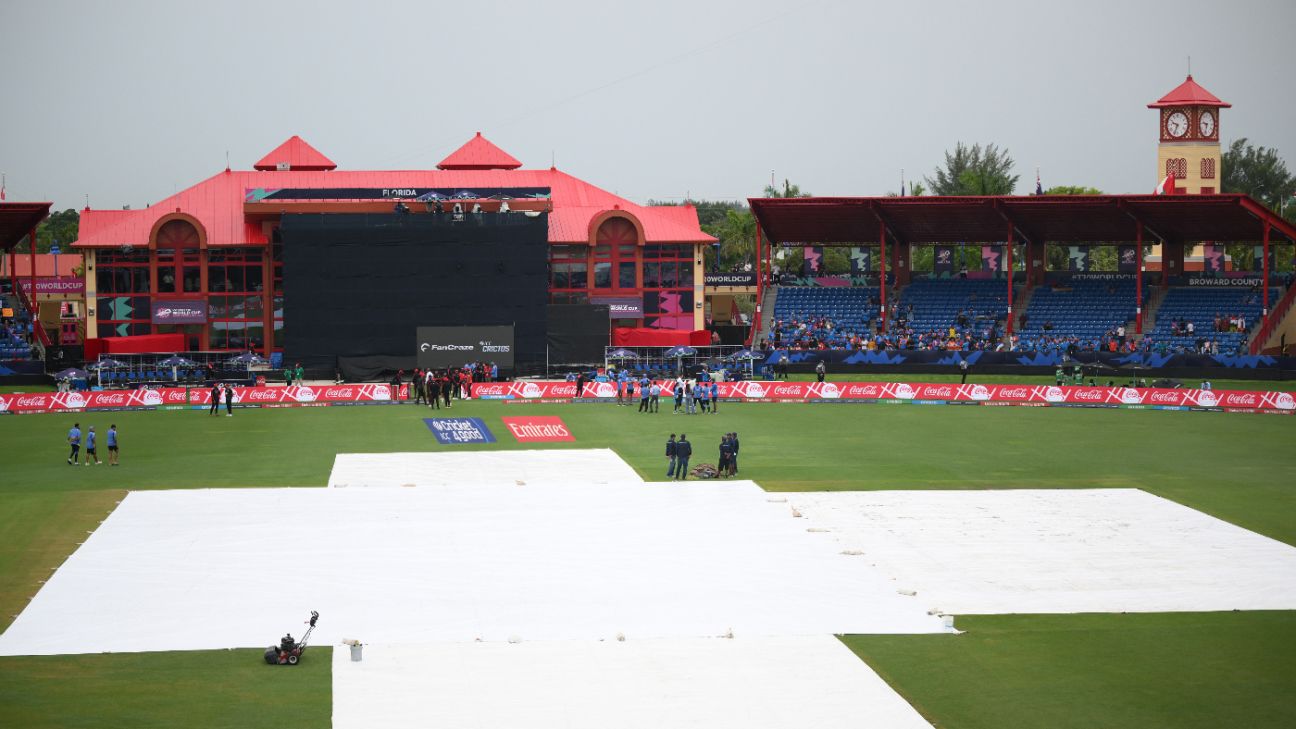World
No rain, but still no play: Lauderhill washouts prompt questions over ground’s preparedness

On a micro level, though, some of what has happened has bordered on the embarrassing. Since 8.30am on Friday, the day Florida was starting to host three back-to-back matches, there has been only about 30 minutes of serious showers – we can’t confirm there wasn’t the odd light drizzle outside of this, but we’re talking proper rain here – at the Central Broward Regional Park Turf Ground. And yet, we have had no play either on Friday or Saturday. Sunday looks dicey too, because one particular part of the outfield is still soft underfoot.
It is difficult to explain no play despite no rain to hardcore cricket fans, leave alone to America, or even the diaspora here who have so many other options. That one side of the ground has drained means the drainage in one part of the ground is good, but not so good in the other. This is hurricane season in Florida and, despite the unprecedented amount of rain received here in the last week, to not repair the drainage before a World Cup should be unacceptable.
Quite often, when drainage is not great, cricket stadiums cover the whole playing surface, but here they don’t have any more covers than the ones covering the square and the bowlers’ run-ups. That, for a World Cup, is not a good look.
Quite often, when drainage is not great, cricket stadiums cover the whole playing surface, but here they don’t have any more covers than the ones covering the square and the bowlers’ run-ups. That, for a World Cup, is not a good look. You wonder how the ICC’s commercial partners feel about this.
This is not to make light of the record rainfall the area has received in the days leading up the matches. There have been flash floods in and around southern Florida, leading to serious losses. Cricket is nothing in comparison. The groundstaff have tried their best on the day, but there was no way the umpires, who are in charge of player safety, could okay play.
Again it is not about the effort but the equipment. Not that it would have had any impact on the games, but the Super Sopper ran out of fuel on Friday afternoon (insert irony jokes about the USA running out of fuel) and then broke down, only repaired later in the evening. That the Broward County, in charge of the stadium, doesn’t have more covers should not come as news to the ICC. That should be part of preparations.
All this left the teams mildly frustrated. For Pakistan, the No. 2 seeds in Group A, it was imperative that the games on Friday and Sunday go ahead if they were to have any chance to progress to the Super Eight. For India, who played all their matches in the treacherous batting conditions of New York, it was a chance to get used to better conditions before the more crucial matches. For Canada, USA and Ireland, it was yet another day in the bright lights before they are forgotten for two more years.
“We were really looking forward to play a game and we were expecting better batting conditions than what we got in New York. So as a team I think it was important for us to get a game but, again, something that we can’t control, we don’t control. So, it’s unfortunate that we couldn’t get a game here.”
India will now go from a week of no cricket to playing three Super Eight matches in five days in three different Caribbean islands. Rathour could just shrug and say it is not ideal.
“I think the next time ICC will review this, that the ground should be completely covered, so as soon as the rain stops, we can play the match.”
Pakistan’s Imad Wasim
There was some informal talk among people at the ICC about possibly swapping the 2028 T20 World Cup in England with this one, but it was a non-starter because England’s summer is planned seemingly decades in advance. And there is never going to be the “perfect time” to break new ground so the ICC can’t be blamed for pushing for this even if it did so with less-than-perfect conditions to play in.
It would be too harsh to evoke Oscar Wilde’s quote about best intentions and worst outcomes, but surely the ICC can’t be happy with what has happened over the weekend in Florida?
Sidharth Monga is a senior writer at ESPNcricinfo








